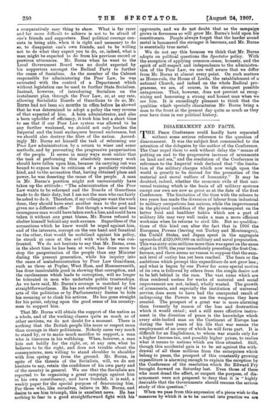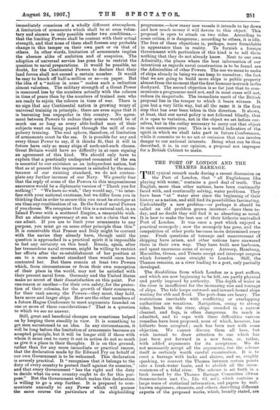DISARMAMENT AND FACTS. T HE Peace Conference could hardly have separated
without some serious reference to the question of disarmament. It was the subject first commended to the attention of the delegates by the author of the Conference. The Czar urged them to seek without delay the " means of putting an end to the progressive increase of armaments on land and sea," and the resolution of the Conference in reference to the Imperial wish declared that "the limita- tion of the military charges which now weigh upon the world is greatly to be desired for the promotion of the material and moral welfare of humanity." It may be doubted, indeed, whether the economic evils of that uni- versal training which is the basis of all military systems except our own are now as great as at the date of the first Conference. The limitation of the time with the colours to two years has made the diversion of labour from industrial to military occupations less serious, while the improvement in the physical condition of the people consequent on the better food and healthier habits which are a part of military life may very well make a man a more efficient workman when he returns to civil life. But no qualifica- tions of this kind can alter the fact that in 1906 the European Powers (leaving out Turkey and Montenegro), the United States, and Japan spent in the aggregate upwards of £320,000,000 on military and naval preparation. This was sixty-nine millions more than was spent on the same object in 1898, the year immediately preceding the first Con- ference, and there seems no'reason to suppose that the sum- mit level of outlay has yet been reached. The fears or the ambitions which prompt this expenditure do not grow less ; and what is begun by one Power for some special motive of its own is followed by others from the simple desire not to be left behind in the race. The vast sums which are thus rendered useless for works of material and social improvement are not, indeed, wholly wasted. The growth of armaments, and especially the institution of universal service, does seem to have had the unexpected result of indisposing the Powers to use the weapons they have created. The prospect of a great war is more alarming than formerly by reason of the loss and destruction which it would entail ; and a still more effective instru- ment in the direction of peace is the knowledge which every able-bodied man on the Continent of Europe has during the best years of his life that war means the employment of an army of which he will form part. It is difficult for an Englishman, to whom war stands only for a higher Income-tax, and possibly higher prices, to realise what it means to nations which are thus situated. Still, though this accidental gain is to be set against the with- drawal of all these millions from the enterprises which belong to peace, the prospect of this constantly growing expenditure is alarming enough to explain the reception by the Conference of the resolution which Sir Edward Fry brought forward on Saturday last. Even those of them who most dread the effect, or suspect the purpose, of dis- armament were not prepared to deny that it is " highly desirable that the Governments should resume the serious study of this question."
When we pass from this expression of a pious wish to the measures by which it is-to be carried into practice we are immediately conscious of a wholly different atmosphere. A limitation of armaments which shall be at once volun- tary and sincere is only possible under two conditions,— that the limiting Powers shall be content with their actual strength, and that none of them shall foresee any probable change in this temper on their own part or on that of others. In other words, limitation of armaments implies the absence alike of ambition and of suspicion. The adoption of universal service has gone far to restrict the question to naval preparations. It would be possible, no doubt, for the Continental Powers to declare that their land forces shall not exceed a certain number. It would be easy to knock off half-a-million or so—on paper. But the idea of a " nation in arms " makes such a reduction almost valueless. The military strength of a Great Power is measured less by the numbers actually with the colours in time of peace than by the numbers of trained men who are ready to rejoin the colours in time of war. There is no sign that any Continental nation is growing weary of universal training in principle; there are even signs that it is becoming less unpopular in this country. No agree- ment between Powers to reduce their armies would be of much use so long as every able-bodied man of their subjects went on being passed through the mill of com- pulsory training. The real sphere, therefore, of limitation of armaments must be the sea. It is possible for any and every Great Power to say, if it thinks fit, that it will in future have only so many ships of such-and-such classes. Great Britain would have no difficulty in at once signing an agreement of this kind. We should only have to explain that a practically undisputed command of the sea is essential to our existence as an independent nation, but that as at present this requirement is satisfied by the main- tenance of our existing standard, we do not contem- plate any further increase of our Navy. We greatly fear that the reply of some of the Powers to this magnanimous assurance would be a diplomatic version of " Thank you for nothing ! " " We have no wish," they would say, " to inter- fere with your national existence, but we differ from you in thinking that in order to secure this you must be stronger at sea than any combination of us. Be the first of naval Powers if you choose. We recognise that this is a natural and, in an Island Power with a scattered Empire, a reasonable wish. But an absolute supremacy at sea is not a claim that we can admit. If you are to limit your armaments to any purpose, you must go on some other principle than this." It is conceivable that France and Italy might be content with the navies they already have, though until the question is approached in a practical spirit it is impossible to feel any certainty on this head. Russia, again, after her tremendous naval reverses, might be willing to restrict her efforts after the re-establishment of her position at sea to a more modest standard than would once have contented her. But there remain at least two Powers which, from circumstances or from their own conception of their place in the world, may not be satisfied with their present naval force. Germany and the United States make no secret of their dissatisfaction on this point. For one reason or another—for their own safety, for the protec- tion of their colonies, for the growth of their commerce, for their rank among the Powers—they must, they hold, have more and larger ships. How are the other members of a future Hague Conference to meet arguments founded on one or more of these considerations P That is a question to which we see no answer.
Still, great and beneficial changes are sometimes helped on by keeping them steadily in view. It is something to get men accustomed to an idea. In any circumstances, it will be long before the limitation of armaments becomes an accepted principle, but it will be longer still if those with whom it must rest to carry it out in action do not so much as give it a place in their thoughts. It is on this ground, rather than for any more immediate or practical reason, that the declaration made by Sir Edward Fry on behalf of our own Government is to be welcomed. This declaration is severely practical. It "recognises that it belongs to the duty of every country to protect itself against its enemies," and that every Government " has the right and the duty to decide what its own country ought to do for this pur- pose." But the Government which makes this declaration is willing to go a step further. It is prepared to com- municate annually to any Power which will pursue the same course the particulars of its shipbuilding programme,—how many new vessels it intends to lay down and how much money it will devote to this object. This proposal is open to attack on two sides. According to some critics, it is dangerous ; according to others, it is idle. The first of these objections is, perhaps, more formidable in appearance than in reality. To furnish a foreign Government with particulars of this kind is to tell them nothing that they do not already know. Next to our own Admiralty, the places where the best information of our intentions as regards naval construction is to be found are the Admiralties of other Powers. The use we mean to make of ships already in being we can keep to ourselves ; the fact that we are going to build more ships is public property almost from the moment that the first hammer is struck in the dockyard. The second objection is so far just that to com- municate a programme need not, and in most cases will not, reduce its magnitude. The immediate merit of the British proposal lies in the temper to which it bears witness. It goes but a very little way, but all the same it is the first step that has ever been taken in this direction. It shows, at least, that our naval policy is not followed blindly, that it is open to variation, not in the object we set before our- selves, but in the outlay necessary to carry out that object in each successive year. This is a useful indication of the spirit in which we shall take part in future Conferences, while it commits us to no act or omission that can involve danger to our national interests. Being what can be thus described, it is, in our opinion, a proposal not improper for a British Cabinet to make.



































 Previous page
Previous page